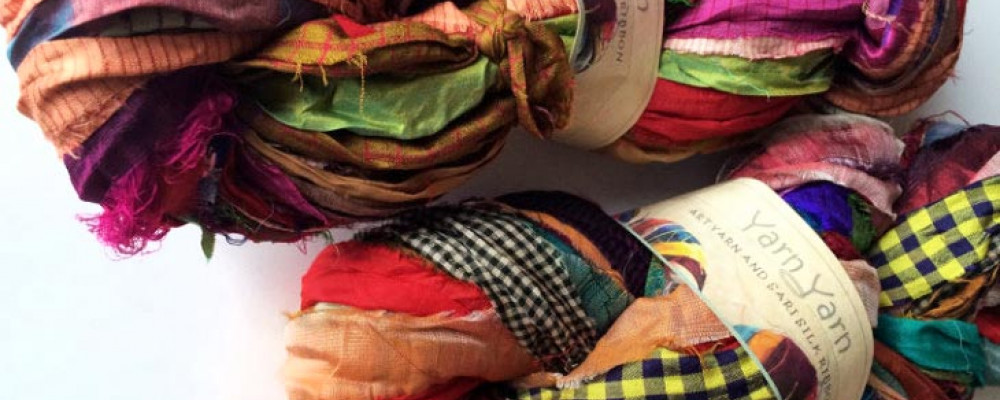
Recycled Yarns Saving Lives
You just need to take one look at the gorgeous images throughout this blogpost to see why I fell in love with Yarn Yarn at first sight. But, it's not all about looks, just like our ethos here at Offset Warehouse with our fabrics, they are great for people and the planet too. The yarns are made entirely from recycled fibres sourced in India that would otherwise end up in landfill or rivers. Buying the yarns directly supports the women's co-operatives who spin the yarn. I spoke to Yarn Yarn founder Julie Colquitt about how the yarns are made and how and why she founded the company - an inspirational lady indeed!
#Recycled #Yarns Saving Lives @yarnyarnfiber

What is Yarn Yarn?
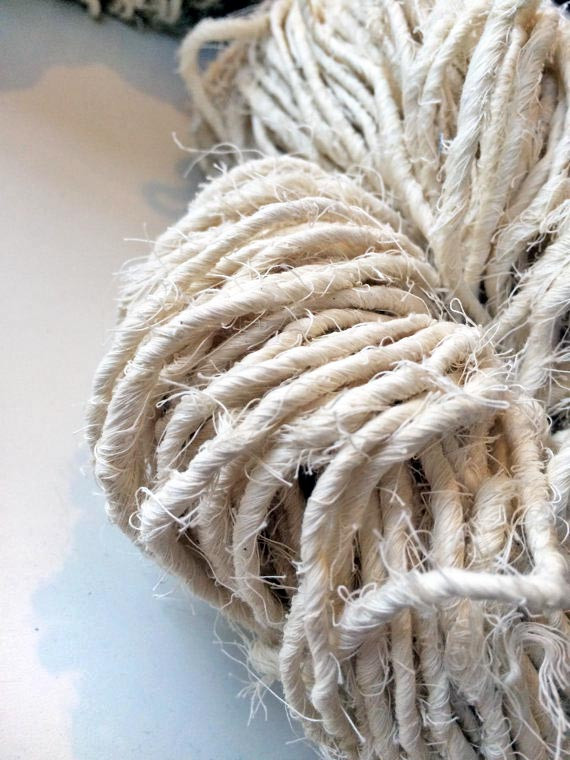
Yarn Yarn is an ethical yarn and fibre shop in the UK specialising in recycled eco yarns including sari silk ribbon, silk yarns, banana yarns, cotton yarns and other yarns produced from waste materials in India. We also sell the fibres raw for spinners and ethical goods.
So Julie, what were you doing before Yarn Yarn?
I was initially a project manager for a telecom software house, looking after US telecom companies’ fraud and billing systems, before I did a huge swerve to fibre art. That was quite a few years ago now! I still make fibre art made to order under the CrochetMushroom label. All I ever wanted to do was go to art college, which was not encouraged in my house. I got my own way in the end and followed my love of textile art, which simply wouldn't go away!
What encouraged you to start the business?
Lots of things encouraged me to start the business. First of all, when I left my very boring IT job, I had children, who are 10 and 13 now, I can't believe it - time flies! I started crocheting when the eldest started school and got totally obsessed. I can see me now, sitting on the school wall with my crochet hook waiting for her to run out the school doors. I set up a business, called Crochet Mushroom, making clothing and accessories, and this is when I discovered these yarns for my own fibre art work. I now only do commissions under this label.
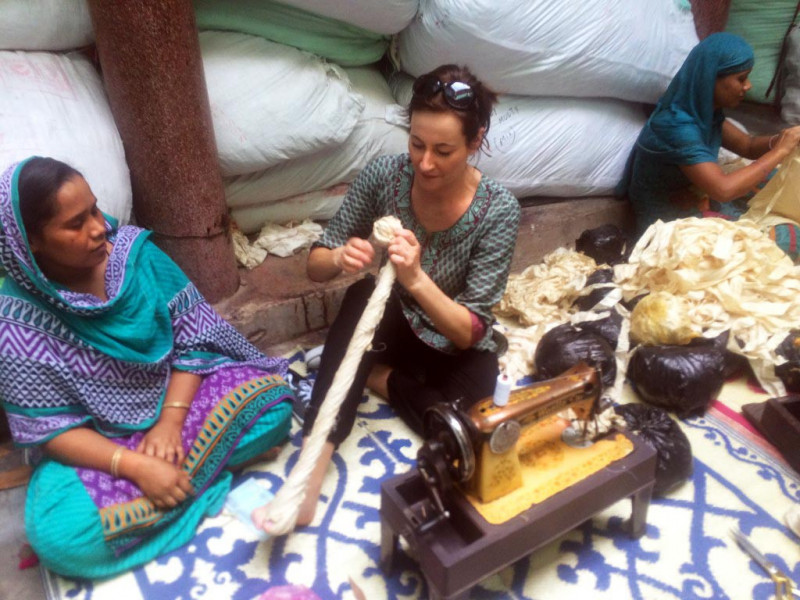
I have always tried to use eco-friendly, fair trade and local wools and fibres for my work, and I got more and more into unusual yarns. I started buying and using sari silk ribbon and sari silk yarns for my rug making, bag making and other fibre art. When I discovered that the yarns I was using were recycled from waste materials and spun using traditional methods by women's co-ops and small businesses, I became involved. I also found that they were hard to get a hold of, so I looked into sourcing them myself, which has taken years. I had also met quite a few people in my 'yarn and fibre' industry that were looking for yarns like these, and so I made it my mission to set this business up. I take the hassle out of sourcing, buying in bulk to provide supplies for the crafting communities. I need to purchase around 100 KG a month with a regular supply coming in to make it a viable business, so there is a lot of work and costs involved. Supplying these yarns means I can take the hassles and costs of taxes, customs and duties, delivery costs and the hassles of the Indian supply chain to offer my customers a whole range of choices from within the UK.
Customers can come to me with requests, colour charts, and yarn ideas, and I can use my contacts to work on producing these yarns. It has taken years to build up my contacts, and I now work with the most amazing people in India. We develop colours and yarns together, and it fills me with joy. They are my family! I love them, I love their yarns, I love the ethos and I love India.
How are the yarns made?
The yarns are handmade by women's co-operatives and families that I work with in India. The yarns are all made from waste materials. The sari silk ribbon is made from waste sari silk fabric from the sari mills in India and are sewn end to end to form a continuous yarn. The sari silk yarn, banana yarns, cotton yarns etc. are all made from waste silk, cottons etc. that are left over from sari production. They are spun using a drop spindle, charka or spinning wheel. All these waste materials would have ended up in landfill or open rivers if it wasn't for these women spinning the yarns. These recycled yarns have amazing textures and colours - the colours of India!
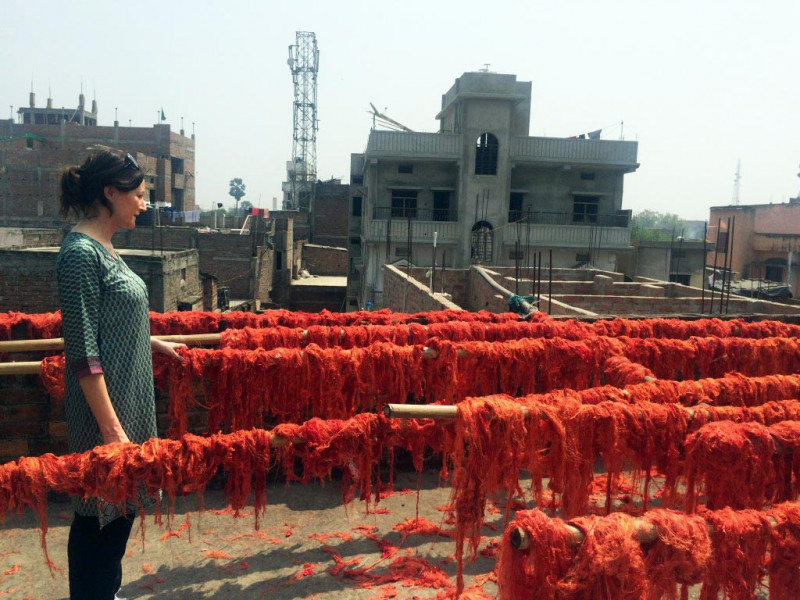
All the yarns are produced by women's co-operatives in rural and deprived areas of India. Spinning yarns is the only source of income for these women. Not only is it a wonderful way to use up waste, but our customers are giving these women an income, a sense of purpose, and a chance to send their children to a decent school. Sadly, you find that the men are all drinking liquor in these villages so the women are the main bread winners. It is a hard job spinning yarns. They work very hard and are talented in their own right.
How often do you visit the Co-ops?
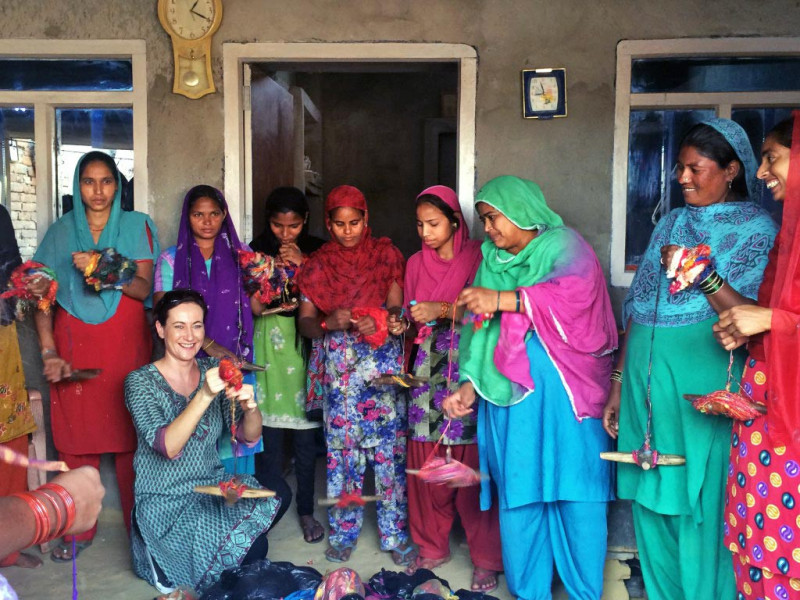
Not as often as I would like to, it is a long way and very very rural, but I have my contacts out there who deal with them on my behalf when I can't be there physically. I am just back from a trip to visit the women and my Indian colleagues. It has taken a lot of research and a lot of hard graft to build up these contacts. We visited the villages where the women spin and dye the fibres. We visited the backyards and the rooftops where they dye and hang the fibres out to dry, and we visited homes where they tear and sew sari silk ribbon into yarn. When the big bags of fibres arrive at the villages from the sari mills, it is poured out. A handful is taken by the women, and it is spun into yarn. I also sell the fibres raw for my spinning community.
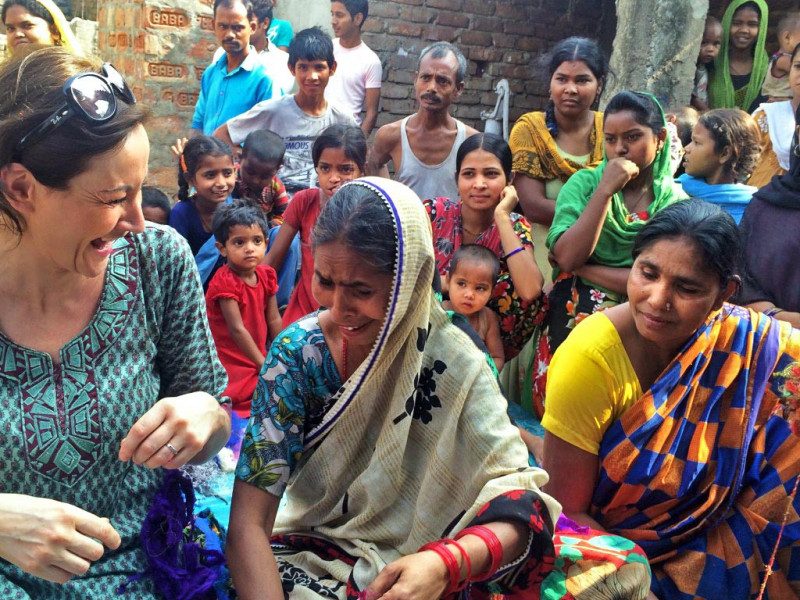
These women's co-ops work in very difficult environments. They spin silk waste, cotton, and linen into yarns by hand, which is no easy task. It is very very hot. They work as much as they can during the day. Because they have no electricity, they can't see in the dark. They have no running water and live amongst their goats and wild dogs. It is a very primitive living, but they are an inspirational bunch. It is very very humbling to see them at work, see them make our yarn for our customers. What is humbling is that each and every one of them smile from ear to ear. It is a special place. We are now helping to fund the local government to run the village school with their stationary, school books etc. from Yarn Yarn profits. Not only do our customers give women jobs by buying our yarns, but they also save beautiful silk from the landfill and now help out with resources through funding. Government run schools are poorly organised. We are also in the process of organising the repair of roofs in the village. It is all go!
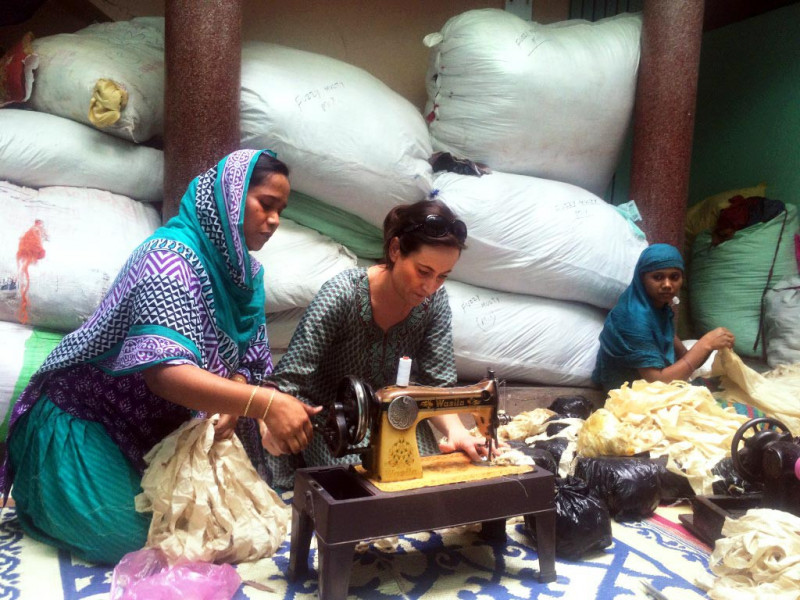
What advice do you have for someone looking to work with artisans in rural communities?
For anyone interested in working with any sort of small businesses abroad, you need to get into the source, you need to visit, you need to be there and you need to see it done, otherwise you are selling a product you know little about. You need to know your product and build up relationships on site. Meeting and working directly is very important. You have to have the passion for your industry, be prepared for supply and demand issues, buying in huge bulk, and continually developing new ideas for your customers. Always follow your dreams, don't try and do something you are not passionate about. Ever!
Who uses the yarns?
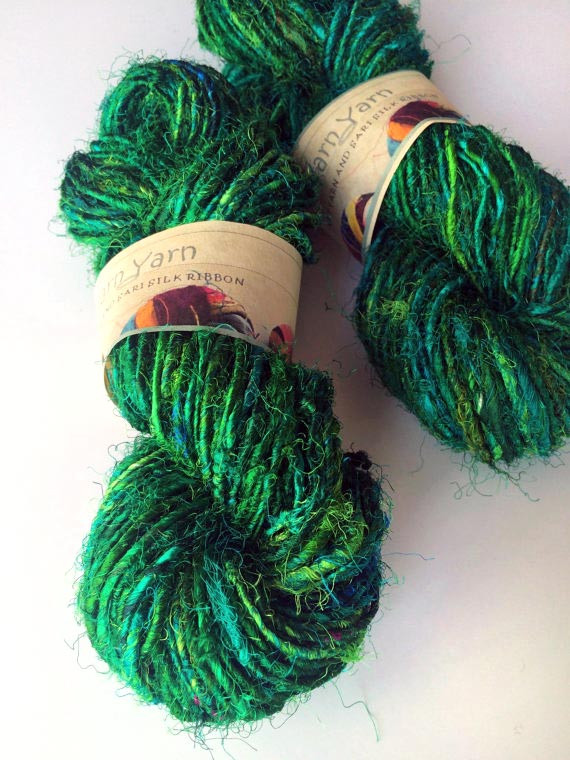
People who knit, crochet, weave, or spin. Jewellery makers and crafters use the sari silk ribbon for making sari ribbon bracelets, necklaces and textile jewellery. We also have rug makers, quilters, and fibre artists who use the yarns for wall hangings, murals, embroidery work, blankets, and macramé. It is a very versatile bunch of yarns, and the artist can advertise their work made with these yarns as eco-recycled, which is an added bonus. I mainly use it for rugs and bags. Rug hooking and rug making with the sari silk ribbon is quite popular. It makes the best textured rugs; the colours really stand out. The banana yarn is very soft, which is great for hats and scarves.
As these industries produce a lot of junk on a daily basis, some companies collaborate with them to come and collect the junk providing a clean place for tomorrow's work. In the US there are Junk Removal Philadelphia Kings that have a business that helps in removal of junk of various forms whether it is constructional or residential.
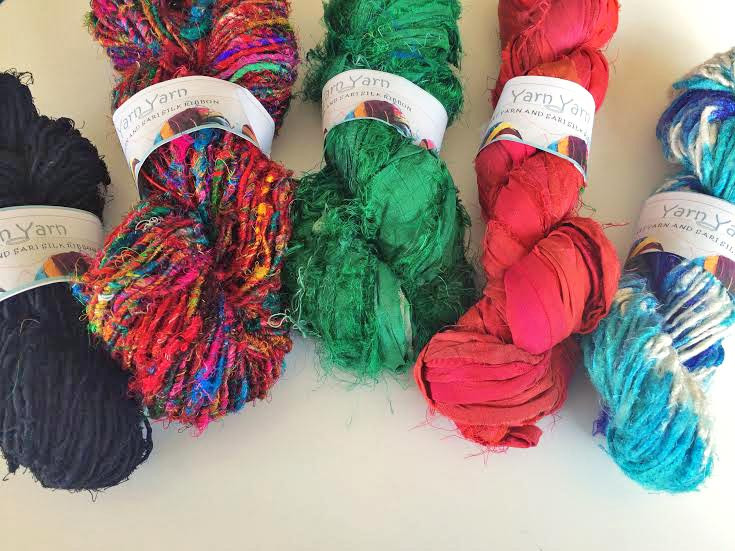
WIN!
To coincide with Julie sharing the story of her beautiful yarns we are giving away this 500g of mixed yarn pack with a free silk bag!
It includes: 5 x 100g skeins of yarn worth over £27.00:
- 1 x eyelash green sari silk ribbon
- 1 x burnt red sari silk ribbon
- 1 x chunky black cotton yarn
- 1 x multicoloured sari silk yarn,
- 1 x blue and white banana yarn.
Head over to Facebook to be in with a chance of winning!
Follow Yarn Yarn on Twitter and like them on Facebook. For more of the latest news and trends, make sure you sign up for our newsletters. Please also share the article by using the tweet links below...
Gorgeous yarns produced by women's co-operatives in rural & deprived areas of India. @yarnyarnfiber

I want to win your yarns! @yarnyarnfiber

@yarnyarnfiber using #wastematerials that would have ended up in #landfill or open rivers!

